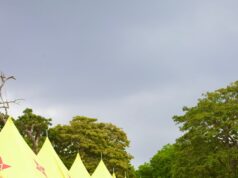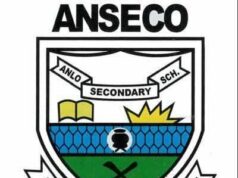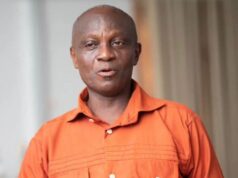In an exclusive interview, Ghanaian investigative journalist Anas Aremeyaw Anas talks to RFI about the ongoing court cases against several judges implicated in his undercover sting operation revealing alleged corruption within Ghana’s judiciary.
Anas speaks about Ghana’s 2016 elections and his next “huge” undercover investigation involving several African countries and the West.
You play many different roles – are you a journalist, a policeman or a private investigator?
I am anything that anybody wishes to call me – what is important to me is that I’m able to impact on society in a progressive manner. I’m able to solve situations within my continent very, very well. So I don’t really mind what anybody refers to – you can call me a journalist, you can call me a spy, you can call me a private detective, whatever you want to call me. I love all those names.
Is Anas Aremeyaw Anas one person or many?
Anas is one person, on one hand – who started something – but Anas now is a brand. It is something that is done by many.
So physically Anas is one person?
Yes, physically Anas is one person who directs the work.
But people can think of Anas as many?
Yes, because of the impact and because of the kind of journalism that I embark on. It affects many lives and sometimes it’s incredible and people begin to think that it is many people who do that. People have this notion that it’s not possible for one person to be able to do it, but I can tell you it’s one person, we do everything from scratch.
Ghana goes to the polls this year. Do you think corruption in Ghana has improved or worsened under President John Mahama?
I’d rather not look at it from a partisan political point of view because I’m not a politician. My work transcends all political parties, but I work as a journalist – name, shame and jail. I found corruption during the [John] Kufuor administration and I tackled it.
I found corruption under the [John Atta] Mills administration and I tackled it. I found corruption under the Mahama administration and I tackled it. Corruption will always be there, it’s our attitude towards it which makes the difference. My kind of journalism probably shows this more because it deals with three tenets – naming, shaming and jailing – I make sure I follow through to see that that is done.
Perhaps that’s what gives the notion that when I’m working within a particular government or within a particular dispensation, it becomes so glaring. However, if you look at it holistically, it is just that as a journalist you have to keep your eyes open. You have to make sure that it doesn’t matter the colour of any administration, you’ve got to work because my commitment is to the people of Ghana and not to political parties.
Has oil production in Ghana had an effect on corruption?
Certainly, oil has attracted a lot of dubious characters into the country and it’s not just Ghana, also Nigeria and many other oil-producing countries on the continent. What we have to do, whenever this happens – it must increase our antsy-ness, it must increase our sense of looking for where these bad guys are.
I’m sure that, perhaps, many more bad guys would target Ghana and come this year, next year. What we have to do is make sure that whatever decisions have been taken – that we want to use our oil money for – we make sure that we police government.
The effects of your investigation of corruption, alleged corruption within the judiciary are ongoing. Are you satisfied with the results? Has it gone far enough?
It’s been a very interesting moment, it started with the story breaking, scepticism as usual, people coming out fighting it, saying that, ‘we didn’t take the money’. I have always maintained a very cool dispensation or disposition, saying let time be the judge. Due process in itself is the way out, let’s give them an opportunity, let them come with their lawyers, let’s confront them with the evidence and let’s see who is telling the truth.
I’m glad that this process has gone on and so far more than 26 judges have been fired as a result. They were not fired in a vacuum, I went there, they brought some 7-8 lawyers, I showed the evidence. Whatever the results are, they must be subjected to critical scrutiny, it must stand the test of the law. That’s what I have gone through, that’s why I feel very satisfied that some people have been sacked.
There are over 200 judicial staff, we’re still going through the process, many of them have been fired, so it’s not just about publishing. I don’t do journalism to let somebody read the story from his bedroom and be happy. I do journalism to find the effects, to put smiles on the people who put me to that work, the citizenry.
So in my opinion it’s gone pretty well, the people have been given fair opportunities. But some were also complaining that there must be prosecution. The administrative action is different from the prosecution aspect. We are yet to step into the prosecution and I’m very confident that everybody I named in this judges scandal will go down because the evidence is impeccable and unimpeachable.
How far will go in collecting evidence in the name of the public good?
Undercover is a last resort, if there’s a conventional way of getting the information I will not bother, but crime has heightened, its gotten so high. If you don’t adopt such measures which shows you the evidence raw, you give room for the bad guys to punch holes into you. It’s not like the West where institutions are developed – where your arms of government, your judiciary, your executive, your legislature are developed, you have institutions that will troubleshoot the issue.
Here on the continent, we have problems, institutions are not properly developed, the bad guys have a lot of money, they want to bribe their way through many processes. So a journalist of my kind must adopt measures to silence them for once and for all. And I tell you, if you have the hardcore evidence, no amount of pressure, no amount of money will put you down, you’ll be able to look forward and you’ll march confidently because you know you’re doing it for the people, and you are doing it genuinely for progress of society. So yes, I’ll go far, as far as that is the antidote to help nip corruption in the bud in our communities.
Do you ever feel sorry for any of the people you expose?
It’s a very difficult question. Look, you’ve got to be focused, sometimes the questions these people ask is, ‘why me, many people are doing it, why me?’ I don’t select people, before I go undercover, we have what we call establishing the prima facie evidence. So if I catch somebody committing a crime, or having committed a crime on a hidden camera, I catch that person because the person is in the habit of doing that. And it doesn’t matter how small or big you are, once the axe comes, you ought to fall. The point is that corruption will be tackled from all angles, it doesn’t matter if the person is small or big. So it’s sometimes difficult and sometimes painful that you are going to take food off the table.
Look at the judges, some of them have worked for 25 years, but measure it against the public good and ask how many bribes had this judge taken in his life? Look at rape cases, there was a judge who took money for rape, a judge who took money for land, a judge who took money for armed robbery. How do I know that the same armed robber that the judge has freed, could one day take a gun and attack me in my house. At the end of the day, it’s the public good that’s important, no matter the pain.
How worried are you about being exposed? Does it keep you up at night?
It’s a very uncomfortable feeling to have, living and thinking that the bad guys are always on your heels and they want to expose you. But we put in [place] enough security measures, enough security protocol, to ensure that this doesn’t happen, but it can sometimes be nervous, it can sometimes really slow down things. So far, we’ve done our best and we continue to do our best.
What’s your favourite disguise?
I love my prosthetics, they work very well. When I wear them it’s very difficult to be able to tell. In a day I can change into five faces and that works for me so well.
What are you working on at the moment? There have been reports on an investigation into a teaching hospital in Kumasi.
I’m doing some quite elaborate investigations, very huge, across the continent. I’m sure the world will get to see it and it will air on a major international network. Unfortunately, I’m unable to give you details, but I can tell you, it’s hot, stay tuned for it.
Can you tell us which country?
It will be countries, not country, but it will also involve a country in the West.
Can you give us a general theme maybe?
Its interesting, it’s going to be about children, it’s going to be about some abuse, you’ll be shocked at the details, you will see.
Source: RFI






















